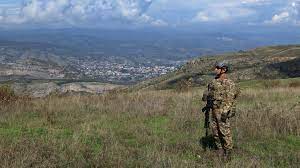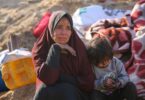Arshak Makichyan
We always underestimate the power of propaganda and dictators. No one believed that Putin would start a full-scale war in Ukraine, but he did. Before that, Russia waged war in Georgia, Syria and Donbass.
Now, weeks after seizing control over the breakaway Armenian region of Nagorno-Karabakh, Azerbaijan could be readying an invasion of southern Armenia proper, according to US Secretary of State Anthony Blinken. It may happen as soon as in the coming weeks. It is rather difficult to react to news like this. I thought perhaps Azerbaijan is trying to distract us from the ethnic cleansing in Artsakh (Nagorno-Karabakh’s Armenian name) that took place just a few weeks ago. These statements were later refuted, and it turned out that they were apparently only discussing theoretical possibilities. But as experience shows, dictators usually do not stop until they are resisted.
And unfortunately, the threats are more than theoretical. They are real. On one side are Presidents Recep Tayyip Erdogan and Ilham Aliyev of Turkey and Azerbaijan, who demand the opening of a corridor linking Azerbaijan with its exclave of Nakhchivan and Turkey through the Syunik region in southern Armenia. On the other side stands President Vladimir Putin, who does not want Russia to lose influence in the region. After the Armenian Genocide and the wars that followed, the independent First Republic of Armenia, which had an area twice the size of Armenia’s current territory, was divided between Turkey and the Soviet “Union” (actually occupation).
Now, unfortunately, the inheritors of these same empires are moving to solve the Armenian Question once and for all. And now Russian propaganda has started discussing war in Armenia as a way to compensate for the failures in Ukraine. It is simple street gang logic. Always strike first. If rebuffed, you always can attack someone else. It is difficult to predict how this will play out. Perhaps Azerbaijan will attack and Russia will again put itself forward as a peacekeeping force.
But we already know the price of Putin’s promises. Moscow and Baku violated the 2020 ceasefire by starting the blockade and military operation. As a result, 100,000 people were forced to leave everything and flee the lands where they had lived for 3,000 years to Armenia, a poor country with closed borders with most of its neighbors. This reminded many people of the first genocide, when Armenians were massacred and no one helped. Almost all Armenians say now that Russia betrayed Artsakh and Armenia, and the government has started to distance itself from Moscow. But this will not be the end of Armenia’s troubles.
Russian propaganda is trying to lay the groundwork for instability. One of Russian television’s most influential propagandists, Vladimir Solovyov, said a military operation in Georgia and Armenia would be good for Russia, as it would give Moscow a land connection with its wartime ally Iran. Few people paid attention, but these are not empty threats. Russia still has a military base in Armenia, posing a threat to Armenian statehood. Armenians understand this.
But they also understand their economic dependence on Russia as the largest economy in the region. Russia also uses soft power. Moscow had close ties with Armenia’s former corrupt presidents, who maintain their platforms and managed to grow rich at the country’s expense. But, unfortunately, perhaps because of Russia’s influence, some of these corrupt officials like former President Robert Kocharyan have escaped jail. And there is, for example, Mika “Burger” Badalyan, a pro-Russian blogger who calls for a revolution in Armenia.
His message is boosted by Solovyov and the editor-in-chief of RT, Margarita Simonyan, who have promoted fundraisers for his activities. When he violates Armenian laws, the Russian Foreign Ministry intervenes for him, even though he is an Armenian citizen. After Baku launched airstrikes against Stepanakert, these propagandists promoted protests against the Armenian government based on false claims. But the government in Yerevan did not fall, as Badalyan and his supporters failed to appreciate that activism needs organization to succeed. I am an activist myself, and have been to many protests in Russia. If it were not for the fact Moscow would exploit any power vacuum, I, as a soon to be Armenian citizen, would support the protests calling for change in Armenia.
The government has made many mistakes in recent years, adopting populist tactics and saying Armenia was ready to recognize Baku’s claims over Artsakh. But at least Pashinyan has started to take steps away from Russia, such as ratifying the Rome Treaty to bring Armenia under the jurisdiction of the International Criminal Court. Escaping the influence of Russia may still prove difficult. There are currently more than 100,000 Russians living in Armenia, many of whom fled repression and mobilization in their home country. Armenia is one of the few democratic countries where Russians are allowed without a visa.
They do not extradite people at the behest of Russia. Nor do they stop people entering for unspecified reasons, as Georgia does. But attitudes toward Russia will worsen every year, especially as the new arrivals drive up the cost of living. It is in the interest of all people who oppose Russian imperialism to build a civil society that can resist Putin’s fascism. As important as helping refugees from Artsakh is, that is only the first step.
We have to fight for Armenia against Russian colonialism, which extends far beyond the borders of the Russian pseudo-federation. Now the Russian decolonial movement is awakening across Russia’s republics. And they are the key to mobilizing millions of people much less privileged than Alexei Navalny, who is of course a hero, Ilya Yashin and many other good Russian politicians who have been thrown in prison. Do you know why the Russian opposition failed to stop the war? Because they never became a real civil movement that fought for equal rights for all parts of society. Instead, they behaved as if they were any other political party. Many Russians still struggle to understand what colonialism means to their neighbors. Before the war in Ukraine, I traveled to Georgia and visited the wonderful Museum of Soviet Occupation in Tbilisi.
After I wrote that I dreamed about such a museum in Armenia, many “good” Russians came to my comments section to explain that nobody occupied Georgia and that Stalin was a Georgian. Moreover they, the “good Russians” that they are, tried to help their Soviet brother Armenia during the catastrophic Spitak earthquake. It’s a pity they didn’t do something as simple as open Wikipedia to read the history of the Turkish and Soviet war against Armenia. History is repeating itself yet again. But I hope we can still prevent the worst from happening.
To do so Armenia would need military support from the West and sanctions against Azerbaijan. The Armenian diaspora, including in Russia, will be essential for this. Armenia may be an independent state, but it will be very difficult to wrench itself free from Russia’s zone of influence. Putin still has a lot of instruments of pressure on Armenia. And rest assured, he and his dictator friends will continue to threaten Armenian democracy.
That democracy, our mountains (though Mount Ararat, our national symbol, has long been controlled by Turkey), our lives and our history are the only things we have left. Armenia needs allies now who can be trusted. I dream that the country will finally gain true independence and that the world will not let the empires of Russia and Turkey occupy Armenia again. I hope that a miracle will happen. But even if the war does not start tomorrow, we have a huge job ahead of us to save Armenia from the threats it faces on multiple sides. The Moscow Times







